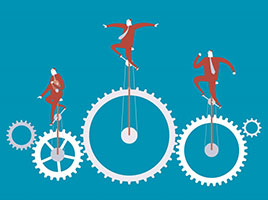With the right ERP system, you can reach your desired destination. With ERP software that enables you to gain a stronger structure in terms of operational and financial terms, we have reviewed 4 items.
You have worked hard to build your growing business and want to guard it. You therefore want to make sure you know what you will gain before you invest your money in any new product or service. Now you may be wondering how an enterprise resource planning (ERP) system can affect your bottom line.
“Any responsible business owner will ask what a new business management system will bring them, and so they should,” says Lionel De Oliveira.
“It is a big step to adopt new software and roll out a new system across all departments, but with the right partner and right solution, an ERP system can take your business to a whole new level.”

Here are four things you will be able to do with an ERP system
1. Get a business system that can be customised
There are a host of ERP solutions today that are built specifically for certain industries and focus on improving core functionalities and processes of, for example, manufacturing, distribution or engineering businesses. This means you can run each part of your business effectively and have all your data in one place. As industries have become more specialised, industry-tailored systems have been developed based on industry best practices to fit your business needs and ensure your operation runs optimally.
2. Gain complete operation oversight
With the correct ERP system in place, you can easily draw up operational and financial reports and get access to data from different parts of the business at the click of a button. This enables you to view the information you need to make informed strategic decisions in real-time. With complete insight into each department, you can respond to red flags before they become critical issues and identify opportunities to grow the business.
3. Increase efficiency through integration
Businesses that depend on paper-based processes generally rely on spreadsheets to collate information. Manually pulling together data from different departments can be time-consuming and increase the risk of human error. An ERP solution automatically collates data into a single digital system, providing accurate and reliable information that can easily be accessed and shared between employees. The result is a more efficient business where people have the right tools to confidently make informed decisions. Another positive result is increased productivity, as instant access to the information they need allows employees to speed up the operational processes within various departments and involving different business functions.
4. Build transparency
One of the challenges of a growing business is keeping up to date on all the activities of staff members without resorting to micro-management. Having an integrated ERP solution means tasks can be allocated to certain staff members or departments and management can easily track the process and status of their assigned tasks in real-time. All data is stored in a central system to provide a single shared version of the truth, reducing duplicated entries and minimising the risk of information being manipulated. This creates a transparent environment where people are accountable for specified tasks. Setting authorisation parameters restricts access to sensitive information to ensure it is contained within the business for use by certain staff members.
“In short, the right ERP solution will enable your company to make informed decisions faster to better manage all aspects of your business, embracing new opportunities and driving profitable growth,” concluded De Oliviera





